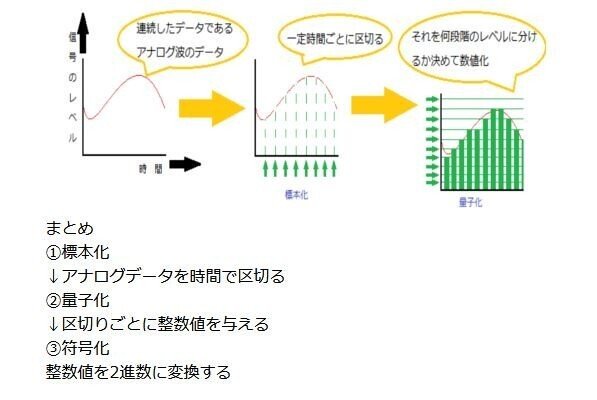
デマを拡散するSNSへの対抗措置はあるのか
この毎日新聞の記事によれば、あの事件の直後、犯人についてのデマが広がっていたという。
安倍晋三元首相が銃撃された事件を受け、在日外国人の支援団体は、SNS(ネット交流サービス)上で根拠なく在日外国人の関与を主張する発信が行われていることについて、「差別デマやヘイトスピーチだ」と批判している。ツイッターには「在日韓国人コリアンが安倍元総理に2発の銃弾」などと根拠の示されていない投稿が拡散されている。
1923年の関東大震災の時と全く変わっていない。あれから何も学んでいないのだ、と思う。
『あの病気』が流行り始める前だったか、駅につながる通路を歩いていると、少し前を歩いていた男が、連れの女性に、中国人(あるいは朝鮮人と言ったかもしれない)について、差別的な悪口を言っているのを聞いた。特定の個人ではなく、一般的な意味で言っているように聞こえた。
『日本人とユダヤ人』という本がある。この本に書かれたことで、最も引用されている言葉があるが、それについては、過去に2回、これとこれに書いた。
その言葉より、私がこの本で、最も見逃せないのは、関東大地震の発生直後に起きたことを書いたこの部分だと思う。しかし、不思議なことに、あまり誰も取り上げようとしないので、先のリンクをチェックしてほしい。なぜ、朝鮮人が襲ってくるというデマが広がったかについて、納得のいく説明がなされている。
また、日中韓3国共通歴史教材委員会『未来をひらく歴史―日本・中国・韓国=共同編集 東アジア3国の近現代史』高文研,2006年という本には、関東大震災直後の朝鮮人・中国人の虐殺に関する記述がある。朝鮮人だけでなく、中国人も、さらに朝鮮人と間違われて殺された日本人もいたのだ。
1923年と今とを比べると、情報の伝播速度は何倍になったのだろうか。情報は、その確かさに関わらず、高速で拡散される。
私は、ソーシャルメディア(SNS)は、イエスとノーを増幅する装置だと思う。アナログデータを極端に二分化したデジタルのイメージである。あるか、ないかだけで、その中間がない状態である。
アナログデータをデジタルデータに変える処理内容は、この記事に詳しい。

これはアナログ形式の音(例えば人間の声)を、デジタル形式の音(例えばCD)に変換する方法の説明なので、グラフの横軸は時間になっている。
横軸を時間でなく、例えばあるテーマに対する賛成と反対の意見の投稿数に置き換えたらどうなるか。投稿しない人はこのグラフに現れないので、ないのと同じである。また、積極的に賛成する人や、積極的に反対する人以外は、わざわざ自分の時間を使って投稿する頻度は多くないだろう。
多分、インターネットに現れる投稿数をグラフにすると、両端が高めで、真ん中はくぼむ、すり鉢状になるだろう。
そして、投稿を自分で書く気はないが、「いいね」を押すことに喜びを感じる人は、どちらかに肩入れして、拡散させる。そうすると、さらに真ん中はへこみ、両端が高くなるだろう。
クリス・ベイル氏は、ソーシャルメディアは、真の姿をゆがませるプリズムだという。
ソーシャルメディアは、 社会を俯瞰するのに使える巨大な鏡ではなく、各自のアイデンティティーを屈折させるプリズムなのだーそれによって私たちは、互いについて、そして自分についての理解をゆがめられてしまう。ソーシャルメディア・プリズムによって、社会的ステータスを求める過激主義者は勢いづき、ソーシャルメディアで政治を議論しても得るものはないに等しいと考える穏健派は〝ミュート〟され、私たちの大半は反対派を深く疑うようになる。そして、ともすると分極化そのものの広がりについても疑うようになるのだ。
インターネットをちょっと見ただけで、極端な意見にさらされてしまう。どうやったら正気でいられるだろうか。
このいじめっ子どもが!
どいつもこいつもケツの穴の小さい雑魚ばかりだ!
ぞろぞろ群ればかり作りやがって!
一人じゃ何もできないのか!
(中略)腐ったような格好しやがって、それでも貴様、日本男児か!?
若者よ!ボーイズビーアンビシャスの精神だ!
てめぇら、何を信じて生きているんだ?金か?女か?
俺様みたいなご立派な大人になりたくねぇのか!?
私はテレビのいわゆるゴールデンタイムでプロレス中継をしていた頃、拡声器を手にした「悪徳マネージャー」がリング上でわめいている場面を何度か見た。その当時はとんでもない人だと思いながら見ていたが、プロレス外の世界では、市議会議員を務めた、至極まともな人であることを最近知った。
この人が1985年に出したレコードで、今でいうラップのようにわめいている言葉を、この記事から引用させていただきました(タイトル写真も、この記事から引用)。
極端な意見が投稿されたら、AIが自動的に判断して、こんなように叱りつけたら、インターネット世界がまともになるんじゃないか、と思う。
過激な発想だろうか。しかし、今のインターネット世界では、「ガキの落書き」が容易に見つかる。大人がいちいち叱るより、AIが代行してくれた方が楽だし、そのほうが納得されるかもしれない。私がIT業界に長くいたせいでそう思うだけかもしれないけれど。
ソーシャルメディア(SNS)をどう扱うべきかについては、まだ意見が定まっていない状態だと思う。この回だけでは書ききれないテーマなので、この後も続きを書いてみたいと思う。
Are there any countermeasures against SNS that spread hoaxes?
According to an article in the Mainichi Shimbun, the hoax about the criminal was spreading immediately after the incident.
In response to the shooting of former Prime Minister Shinzo Abe, support groups for foreign residents in Japan have criticized the fact that messages are being sent on social networking services (SNS) claiming involvement of foreign residents in Japan without evidence, saying that they are discriminatory falsehoods and hate speech. On Twitter, posts such as " Koreans in Japan fired two bullets at former Prime Minister Abe" are being spread without any evidence shown.
Nothing has changed since the Great Kanto Earthquake of 1923. Nothing has been learned since then, I think.
I was walking along the corridor leading to the train station, maybe before the "that disease" epidemic began, when I heard a man walking a little ahead of me making racist remarks about the Chinese (or Koreans) to a woman he was with. It sounded like he meant it in a general sense, not a specific individual.
There is a book called "The Japanese and the Jews." The most quoted words in the book, which I have written about twice before, once here and once here. More than those words, I think the part of the book that I find most hard to miss is this one, which describes what happened immediately after the Great Kanto Earthquake. But strangely enough, not many people want to bring it up, so please check out the preceding link. It gives a convincing explanation as to why the hoax that Koreans were going to attack spread.
In addition, a book titled "Mirai wo hiraku rekishi: Nihon, Chugoku, Kankoku = Kyodo edited by Japan-China-Korea Trilateral History Teaching Material Committee" published by Kobunken, 2006, describes the massacre of Koreans and Chinese immediately after the Great Kanto Earthquake. The book says not only Koreans, but also Chinese, and even Japanese who were mistaken for Koreans and killed.
Compared to 1923 and now, how many times faster has the speed of information propagation increased? Information, regardless of its veracity, spreads at high speed.
I think social media (SNS) is a device that amplifies yeses and noes. It is a digital image of analog data dichotomized to the extreme. There is only yes or no, with no in-between.
The process of converting analog data into digital data is detailed in this article.
This is an explanation of how to convert sound in analog form (e.g., human voice) into sound in digital form (e.g., CD), the horizontal axis of the graph is time.
What would happen if the horizontal axis were replaced with, for example, the number of postings of opinions for and against a certain theme, instead of time? Those who do not contribute do not appear in the graph, so it is as if they do not exist. Also, people other than those who actively agree or actively disagree would not bother to use their time to post as often.
Perhaps a graph of the number of posts appearing on the Internet would be mortar-shaped, with a higher number at both ends and a dip in the middle. And those who have no intention of writing the posts themselves, but take pleasure in "liking" them, will put their shoulders to one side and spread the word. This would further dent the middle and raise both ends. Chris Vail says that social media is a prism that distorts the true picture.
But instead of a giant mirror that we can use to see our entire society, social media is more like a prism that refracts our identities—leaving us with a distorted understanding of each other, and ourselves. The social media prism fuels status-seeking extremists, mutes moderates who think there is little to be gained by discussing politics on social media, and leaves most of us with profound misgivings about those on the other side, and even the scope of polarization itself.
A quick glance at the internet exposes me to extreme opinions. How can I stay sane?
You bully boys!
You're all a bunch of little assholes!
You're all herding together!
Can't you do anything on your own? (omitted)
Are you still a Japanese boy?
You rotten-looking bastard.!
Boys be ambitious!
What do you guys believe in?
Money?
Girl?
Don't you want to grow up to be a respectable adult like me, do you!
When I used to watch live pro wrestling on TV during the so-called prime time hours, I saw several times a "bad manager" with a loudspeaker in his hand ranting in the ring. At the time, I thought he was an outrageous person, but I recently learned that outside the world of pro wrestling, he is a supremely decent person who served as a city council member. I'd like to quote a few words from this article about a record this guy put out in 1985, which rants like a rap song nowadays(Title photo also taken from this article).
I think the Internet world would be a sane place if AI automatically judged extreme opinions when they are posted and scolded them in this way.
Is this a radical idea? However, in today's Internet world, it is easy to find "kids' scribbles. Rather than adults scolding them every time, it would be easier for AI to do it for them, and that might be more satisfactory. I may just think so because I have been in the IT industry for a long time.
As for how social media (SNS) should be handled, I think that opinions are not yet settled. It is a topic that cannot be written about in this session alone, so I would like to continue writing about it after this session.
この記事が気に入ったらサポートをしてみませんか?
